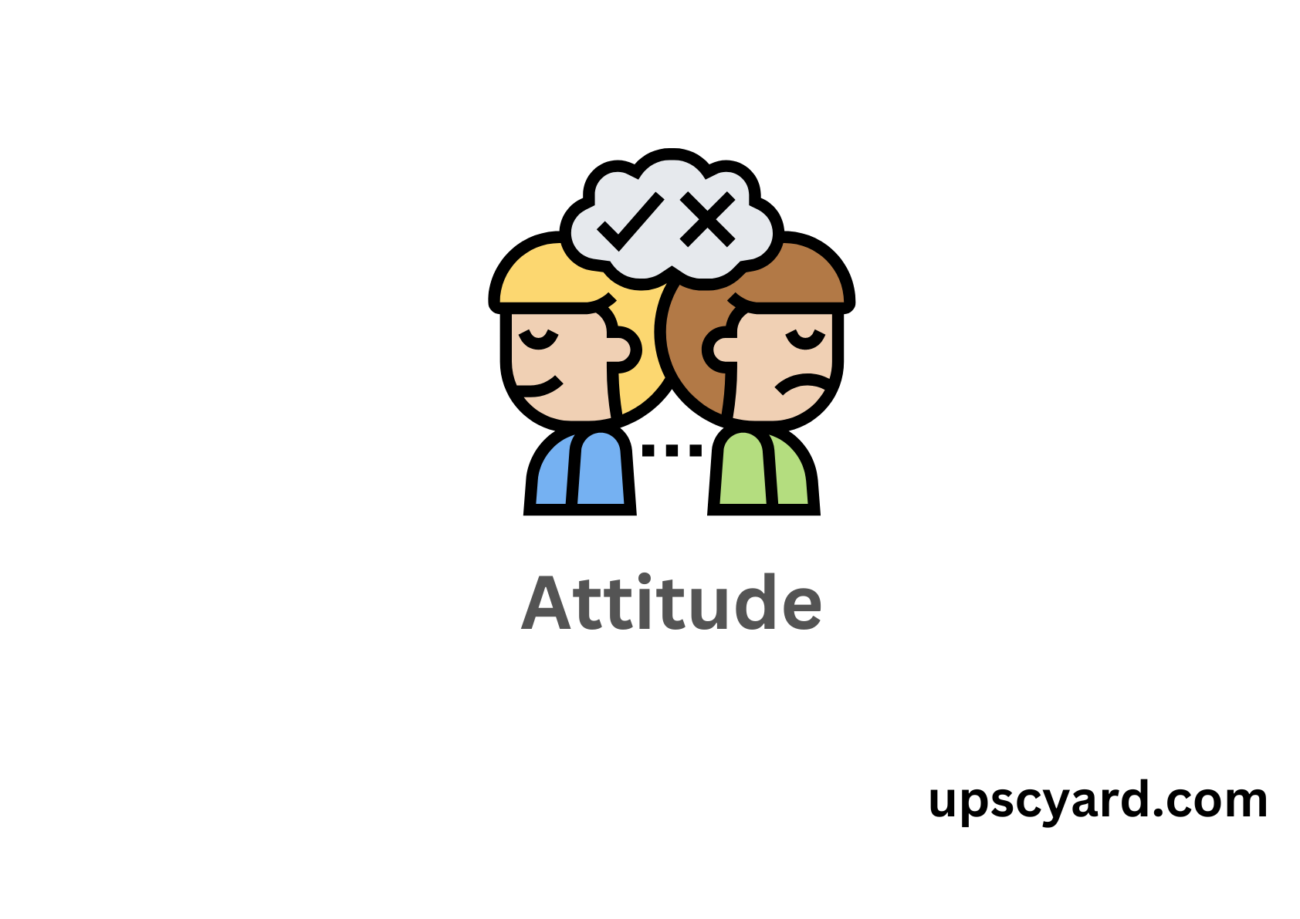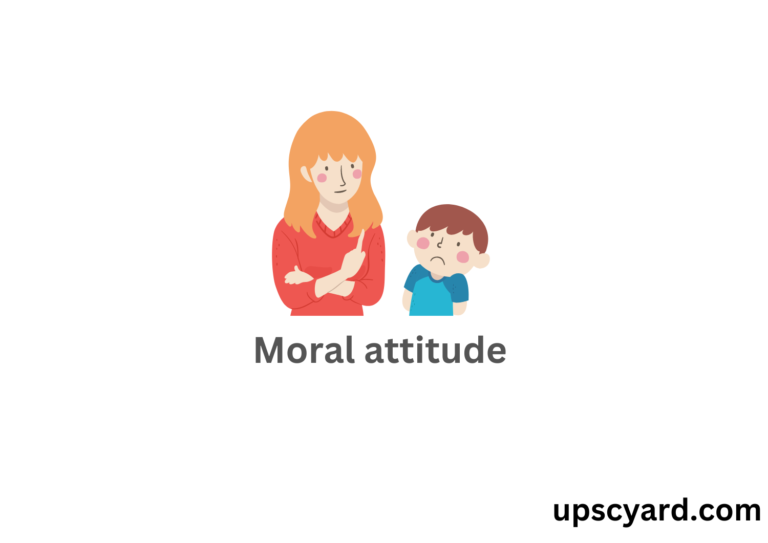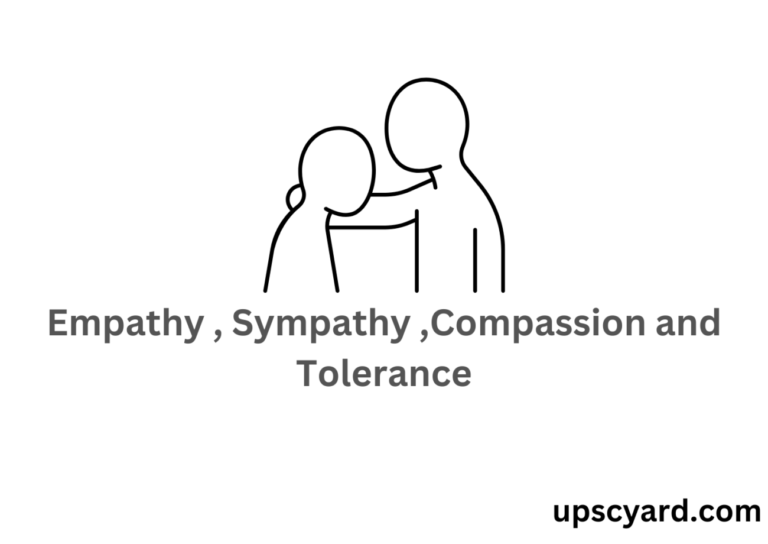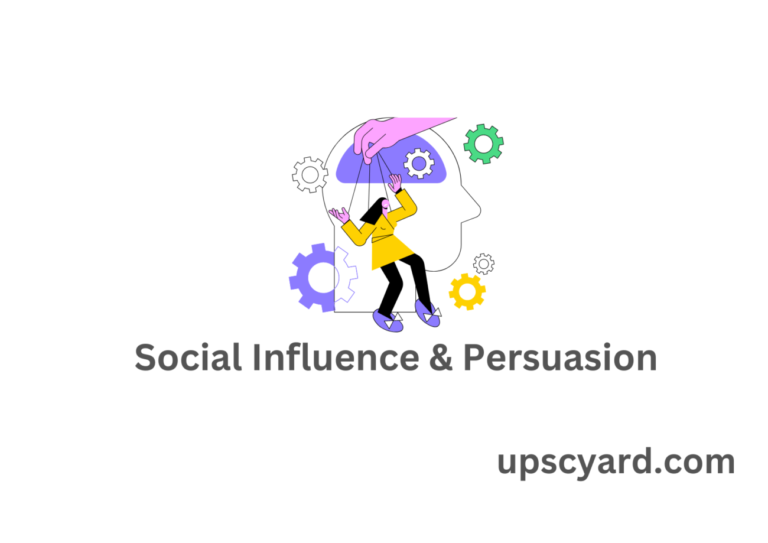Attitudes are inherent psychological tendencies that involve the evaluation of entities with different degrees of favor or disfavor. These evaluations can span from extremely negative to highly positive or be more moderate in nature. Attitudes are not fixed and can be mixed, leading to variations over time towards the same object or situation.
They play a vital role in shaping individual behavior and decision-making processes, and are influenced by personal experiences, cultural factors, and social norms. Scientists study attitudes to gain deeper insights into human behavior and to enhance communication and persuasion strategies.
Examples of emotional / affective factors which are irrational, affecting our behaviour.
- Smashing a tennis racquet after losing a match
- kicking the door because you hurt your feet while closing it
- Hitting the phone because the touch screen isn’t working properly
Components of Attitude and Factors Behind Their Formation
Attitude, a psychological construct, comprises three key components that influence how we respond to objects, people, events, or issues.
- Affective (Emotional) Component:
This component is about the emotional aspect of attitude, reflecting the feelings evoked by the object or subject. For instance, someone scared of spiders exhibits an affective response towards them. - Behavioural (Conative) Component:
The conative part pertains to the behavioral aspect, representing how attitude influences a person’s actions or behavior. For example, someone who fears spiders may avoid them and react with screams when encountering one. - Cognitive Component:
This aspect involves a person’s thoughts and beliefs about the attitude object. It relates to the process of acquiring knowledge through reasoning, intuition, and perception. For example, someone believing spiders are dangerous demonstrates the cognitive component.
Several causative factors contribute to the formation of attitudes:
- Culture:
Culture plays a significant role in shaping an individual’s attitudes. It encompasses various elements such as religion, tradition, customs, rewards, sanctions, and social norms. Culture socializes individuals, imparting acceptable beliefs and behaviors in society. - Family:
Family holds immense influence as the primary social group for individuals. Parents, in particular, shape a child’s attitudes through their guidance and upbringing. Siblings and extended family members also contribute to attitude formation. - Social Groups:
Beyond the family, various social groups, including friends, peers, and colleagues, impact attitude formation. In contexts like voting patterns, social groups’ opinions and discussions often influence an individual’s choice of candidate. - Institutions:
Throughout life, individuals are influenced by institutions, such as educational establishments. Schools and colleges shape beliefs, values, and knowledge, thus influencing attitudes. - Familiarity:
Familiarity tends to breed positive attitudes as people often feel more at ease with the known rather than the unknown. Classical conditioning and familiarity impact emotions, contributing to the affective component of attitudes.
Functions of Attitudes – Simplified
Attitudes serve various essential functions that help us navigate the world and interact with others. These functions simplify our perception and guide our behavior towards different objects, people, or ideas.
- Knowledge Function:
Attitudes act as mental shortcuts, enabling us to make sense of vast amounts of information in our environment. They simplify our perception of the world, making it more manageable and safer. However, in the absence of knowledge, attitudes may lead to stereotyping and misjudgment of others.
Example: People unfamiliar with nuclear energy may develop a negative attitude towards it, perceiving it as dangerous.
- Utilitarian Function:
Attitudes can be driven by the desire to maximize rewards and minimize punishments associated with an attitude object. Expressing socially acceptable attitudes often leads to approval and social acceptance from others.
Example: Politicians may show positive attitudes towards reservation policies to gain support and votes.
- Object-Appraisal Function:
This is the fundamental function of attitudes, providing us with guidance on how to approach or avoid attitude objects. Strong and repetitive attitudes are easily retrieved from memory and simplify our reasoning and behavior. - Ego Defense:
Attitudes can serve to protect our self-esteem or justify actions that might otherwise make us feel guilty. They shield us from internal and external judgment and explain our actions. - Social-Adjustive Function:
Social adjustment leads people to like attitude objects popular among those they admire and dislike unpopular ones. - Emotions Experience Function:
Attitudes help people experience emotions by fulfilling their basic psychological needs. They allow individuals to have emotional experiences, even if they are unpleasant, like in horror movies. For example, positive attitudes towards pets fulfill the need for care, affection, love, and loyalty. - Value Expression:
Attitudes reflect our values and help us establish our identity. By expressing attitudes, we communicate who we are and feel a sense of assertion and identity.
Rewards and punishments play a crucial role in shaping Attitude.

“Me Too: A topic of major ethical significance impacting patriarchal attitudes, fostering solidarity among women, and enhancing legal frameworks on sexual harassment.”
Throughout history, women have endured the burden of shame and fear associated with sexual harassment. They lived in constant dread of their social standing being marred by such experiences. However, in the post-MeToo era, the dynamics have shifted. Now, it is the perpetrator who experiences shame and guilt as their actions are exposed to the world, branding them as sexual predators. The movement’s power has instilled a constant fear of tarnished social images in those responsible for such misconduct. This revolutionary change has transferred the burden of fear, shame, and guilt from women to the perpetrators, regardless of their gender.

POLITICAL ATTITUDES
Political attitudes refer to the attitudes or beliefs that an individual holds when dealing with political issues, guiding their actions and responses. These attitudes are shaped by a combination of rules, regulations, customs, traditions, and beliefs that influence the political system of a country.
The collective political attitudes of a person reflect their overall perspective on the political aspects of society. They essentially define how citizens perceive their relationship with the government and how the political system functions in their country. These attitudes play a significant role in shaping the way individuals participate in political matters and engage with their government.
Reference Topic for dynastic politics: Political attitudes, political culture

The impact of “affective factors” or emotions on shaping electoral decisions.
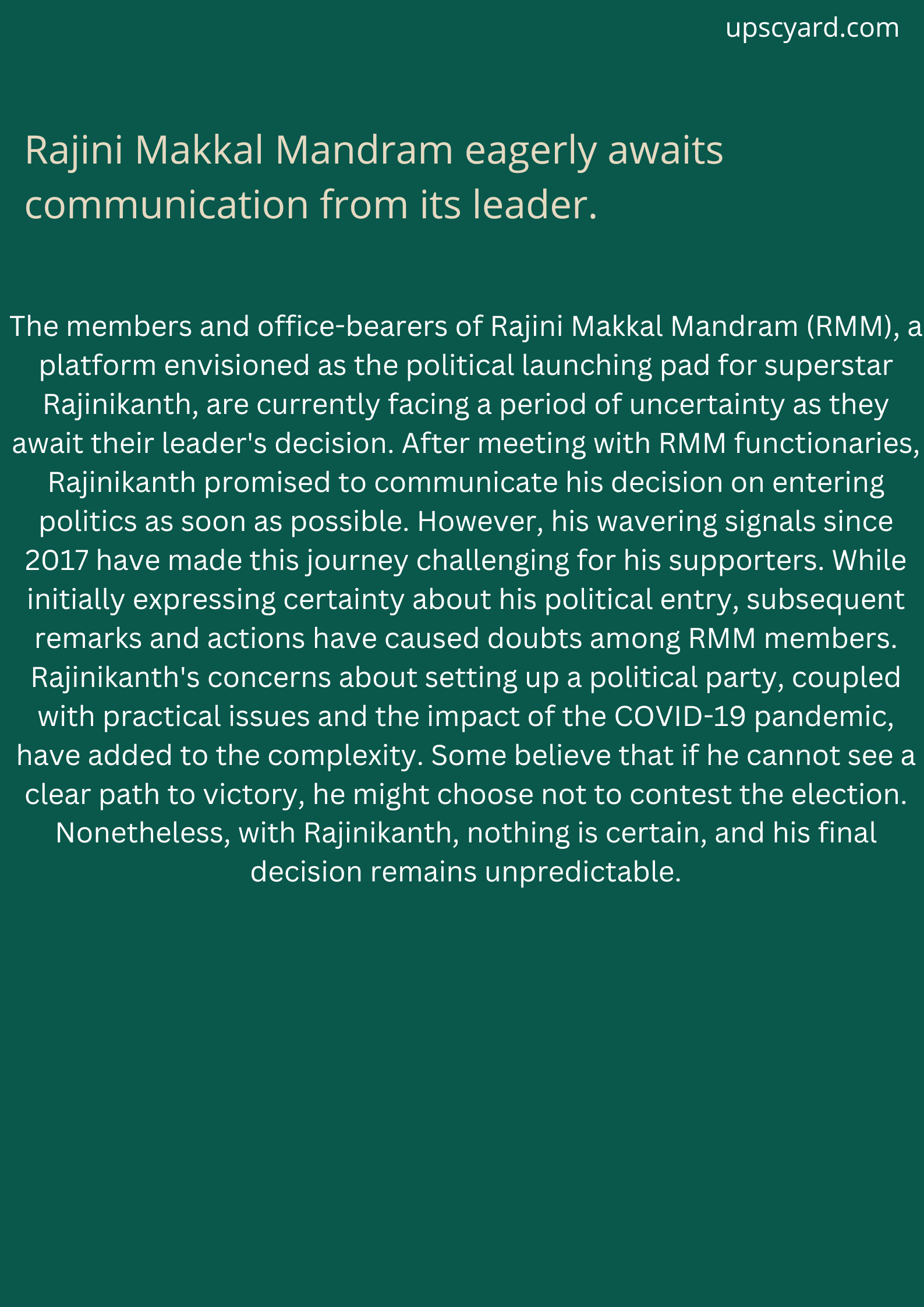
DEMOCRATIC ATTITUDES
- Democratic attitudes are a set of values that strengthen the foundation of democracy.
- Examples of democratic attitudes include:
- Freedom and Liberty: The absence of restraints on individual activities and the provision of opportunities for personal development.
- Equality & Rule of Law: Ensuring equal treatment for all citizens under the law.
- Fraternity: Promoting a sense of brotherhood and solidarity among the people.
- Rights and Duties: Recognizing and respecting the rights of individuals while fulfilling their responsibilities towards society and the nation.
- The Constitution of India secures citizens’ liberties, including freedom of thought, expression, belief, faith, and worship.
- The concept of liberty is closely tied to the law, and the law serves as a condition for liberty.
- In the classroom, students learn about liberty by understanding their rights and responsibilities towards teachers and classmates.
- Liberty allows individuals to question and seek clarification while respecting the boundaries set by the law.
Initiatives are underway to enhance the human rights safeguard system within police stations.
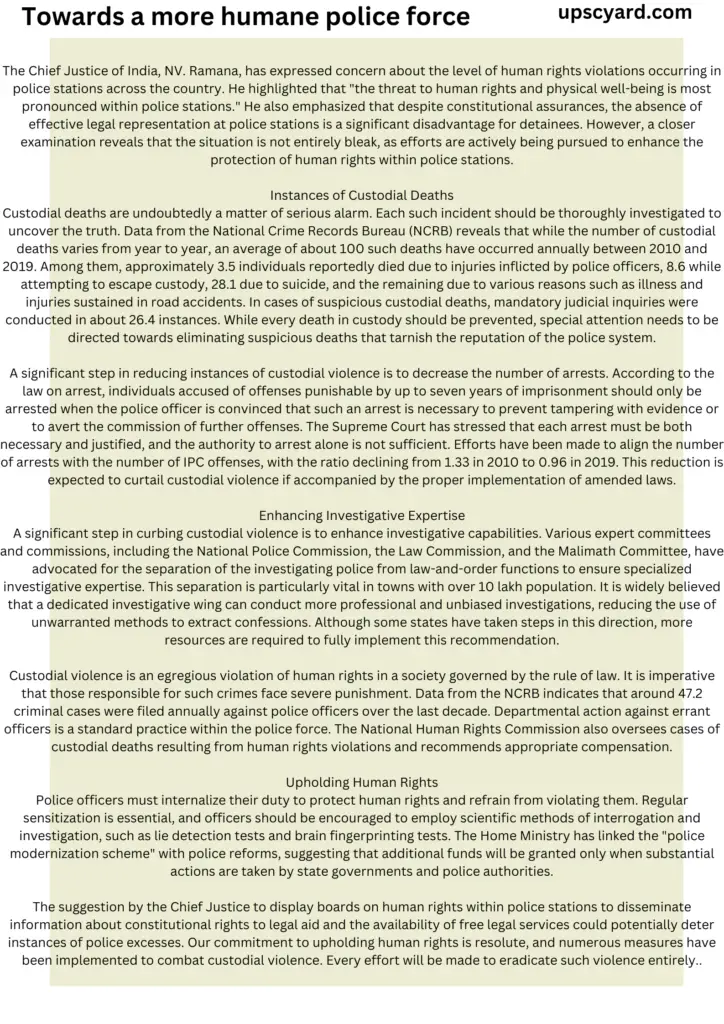
Bureaucratic attitude
The expected attitude of police officers while handling agitations, riots, or protests.
- Sensitized and Compassionate: Police officers should be sensitive to the issues of the protesters and demonstrate compassion towards the people they serve.
- Professional and Competent: Officers should display professionalism, competency, and competence in their duties and responsibilities.
- Restraint and Non-Violence: The use of force should be a last resort, and officers should exercise restraint while dealing with demonstrations.
- Respect for Human Rights: Police officers must respect the rights of protesters, ensuring that their actions do not violate human rights or lead to arbitrary arrests or violence.
- Understanding and Empathy: Understanding the concerns and grievances of the protesters with empathy can help in effectively managing the situation.
- Effective Communication: Clear and effective communication with the protesters and among law enforcement personnel is essential to prevent misunderstandings and tensions.
- Adherence to the Rule of Law: Officers should uphold the rule of law while maintaining public order during protests.
- Training and Preparedness: Proper training and preparedness for handling agitations and riots are crucial for maintaining control and safety.
- Transparency and Accountability: Officers should wear visible identification and be accountable for their actions during protests.
- Conflict Resolution and Negotiation: Officers should prioritize peaceful conflict resolution and negotiation to de-escalate tense situations.
Overall, the attitude of police officers should be geared towards ensuring public safety while respecting the rights and dignity of the protesters and the general public.
Colonial Attitude
A colonial mindset refers to the viewpoint that one’s own culture is superior to the culture of another group, especially when that group has experienced colonization. This perspective can show itself in various ways, including:
- Feeling of Privilege: A sense of entitlement where someone believes they have the right to exploit or control others and their resources.
- Perception of Inferiority: The idea that the colonized individuals are inferior and incapable of governing themselves.
- Imposition of Values: A wish to “civilize” the colonized group by enforcing one’s own cultural norms and practices.
- Neglect of History: A disregard for the history, culture, and traditions of the colonized people.
The impact of colonial attitudes can be long-lasting, causing the colonized population to experience feelings of inferiority, self-doubt, and reliance. These attitudes may also lead to divisions within the colonized community, as people are forced to choose between their own heritage and that of the colonizers.
Examples of colonial attitudes include:
- Believing that the British Empire was the most powerful force globally, and its subjects were considered as “lesser beings without proper laws.”
- Considering the French as a force of “civilizing mission” in Africa, assuming they were bringing advancement to the continent.
- Holding the notion that the United States was destined to rule the Philippines and asserting that Filipinos weren’t prepared for self-governance.
These attitudes are harmful as they result in the oppression and exploitation of other groups. They also strip colonized individuals of their right to self-determination and their unique cultural identity. It is essential to challenge and question colonial attitudes, actively working toward a more equitable and fair global society.


